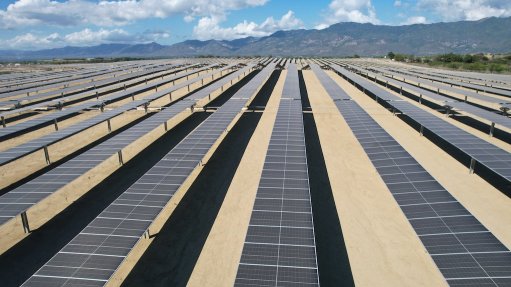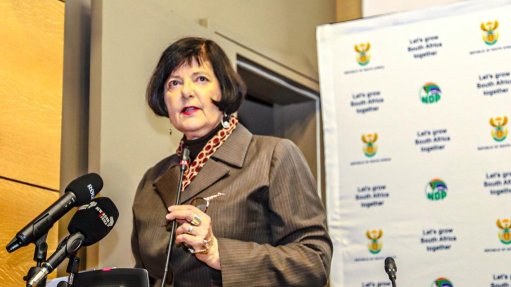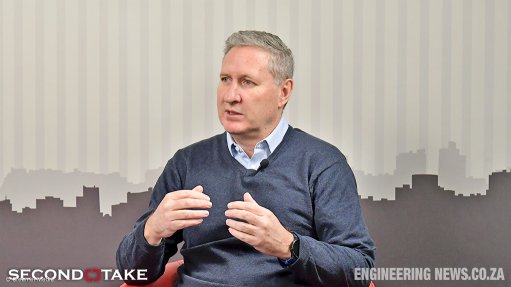Effective circular waste management important to maintain healthy air, study shows
A study by research institute the International Institute for Applied Systems Analysis (IIASA) shows that circular waste management systems can help to effectively curb emissions of greenhouse gases and air pollutants, although the waste sector is often neglected in discussions about climate change and air pollution.
“The absence of suitable treatment facilities to cope with the large quantities of waste, especially in low-income countries, often results in environmental and health impacts, including emissions of toxic pollutants and greenhouse gases into the atmosphere," the IIASA states.
A circular waste management system is a sustainable system in which waste generation is minimised, waste collection schemes reach the entire population, open burning of waste and littering is eliminated, waste is diverted from landfills, materials are reused and recycled and, as a last resort, refuse is efficiently incinerated to generate energy.
While it will not be possible to completely eliminate methane and carbon dioxide emissions from municipal solid waste, the researchers point out that, based on the fact that the maximum technical abatement potential globally is assessed at about 205-million tonnes of methane in 2050, the reduction of emissions from municipal solid waste could ultimately account for almost a quarter of this.
“This highlights the need for fast and bold action to reduce and divert waste from landfills, increase reuse and recycling and promote technologies with carbon capture and storage,” IIASA researchers and colleagues from the University of Natural Resources and Applied Life Sciences, in Vienna, say in the study, in which they examined the waste sectors of 184 countries and regions and which includes a differentiation between urban and rural settlements.
The amount of municipal solid waste generated globally every year has grown exponentially over the past decades, mostly owing to population and economic growth and the resultant changes in production and consumption patterns. While some countries have the means to implement policies and instruments to deal with the garbage they generate and some have enacted policies that aim to reduce waste generation, municipal waste generation per capita remains too high globally, the IIASA says.
One-third of the global municipal waste generated every year is generated by about one-sixth of the population, or high-income countries. However, only about 13% is recycled and 5.5% composted.
According to the authors, waste reduction, together with the adoption of circular waste management systems, will deliver a range of co-benefits, including a reduction of greenhouse-gas emissions, air and water pollution, while also supporting the realisation of the United Nations Sustainable Development Goals (SDGs).
For example, SDG target 6.3, which aims to improve water quality by reducing pollution, eliminating dumping, and minimising the release of hazardous chemicals and materials by 2030, can only be achieved through more ambitious municipal solid waste reduction targets.
“Importantly, the scenarios developed in the study allow for systematically exploring the benefits from improving municipal waste management systems at a global scale and highlight what political and technical actions can be taken in the waste sector on the path towards a circular economy,” the team says.
The research team’s approach translates the shared socioeconomic pathways, which are a set of scenarios describing alternative socioeconomic developments up to 2100, into waste narratives and evaluates the potentials to reduce greenhouse-gas and air pollutant emissions by contrasting baseline and mitigation scenarios until 2050.
“We wanted to look at future trends of municipal waste generation and to analyse the impact on greenhouse-gas emissions and air pollution, if waste management systems were to be maintained at the current state until 2050. Subsequently, we evaluated to what extent it would be possible to reduce waste and associated emissions when implementing circular waste management systems under the different shared socioeconomic pathways.
“This approach also helps us to understand how different world developments hinder or accelerate the level and pace of adoption of the circular waste management system and the implications on emissions,” says IIASA Pollution Management Research Group and study lead author Adriana Gómez-Sanabria.
The researchers found that variations in socioeconomic assumptions underlying each of the shared socioeconomic pathways lead to significant differences in future municipal waste management flows. They estimate that the lowest quantities of solid waste generation are expected in the scenario where countries focus on achieving energy and food security goals within their own regions at the expense of broader-based development, as well as in the high inequality scenario owing to slow economic growth and large inequalities between regions.
“The results further indicate that lower purchasing power in low-income regions will reduce the acquisition of goods, thereby reducing the amount of municipal solid waste generated. By contrast, the highest level of municipal solid waste generation is expected in the scenario in which the world depends on competitive markets, innovation, and participatory societies to produce rapid technological progress for sustainable development, concomitant with the steep rise in both income and urbanisation rates,” the researchers highlight.
However, the sustainability scenario, which envisions a world that emphasises more inclusive development that respects environmental boundaries, could bring major and earlier co-benefits compared to scenarios in which inequalities are reduced, but pollution control measures focus on treating pollutants in a separate process after they are produced.
"In this scenario, the researchers estimate it would be possible to eliminate open burning of waste before 2050, thereby eradicating this source of air pollution," the team says.
“We are confident that our detailed representation of the municipal solid waste sector and associated emissions and mitigation potentials can be used as input to integrated assessment models and applied to develop emission scenarios for the Intergovernmental Panel on Climate Change.
"Our work can also be used to support regional and local scale air and water pollution studies, and inform local and national governments about the likely developments, environmental consequences and mitigation opportunities in the municipal solid waste management sector,” Gómez-Sanabria says.
Comments
Press Office
Announcements
What's On
Subscribe to improve your user experience...
Option 1 (equivalent of R125 a month):
Receive a weekly copy of Creamer Media's Engineering News & Mining Weekly magazine
(print copy for those in South Africa and e-magazine for those outside of South Africa)
Receive daily email newsletters
Access to full search results
Access archive of magazine back copies
Access to Projects in Progress
Access to ONE Research Report of your choice in PDF format
Option 2 (equivalent of R375 a month):
All benefits from Option 1
PLUS
Access to Creamer Media's Research Channel Africa for ALL Research Reports, in PDF format, on various industrial and mining sectors
including Electricity; Water; Energy Transition; Hydrogen; Roads, Rail and Ports; Coal; Gold; Platinum; Battery Metals; etc.
Already a subscriber?
Forgotten your password?
Receive weekly copy of Creamer Media's Engineering News & Mining Weekly magazine (print copy for those in South Africa and e-magazine for those outside of South Africa)
➕
Recieve daily email newsletters
➕
Access to full search results
➕
Access archive of magazine back copies
➕
Access to Projects in Progress
➕
Access to ONE Research Report of your choice in PDF format
RESEARCH CHANNEL AFRICA
R4500 (equivalent of R375 a month)
SUBSCRIBEAll benefits from Option 1
➕
Access to Creamer Media's Research Channel Africa for ALL Research Reports on various industrial and mining sectors, in PDF format, including on:
Electricity
➕
Water
➕
Energy Transition
➕
Hydrogen
➕
Roads, Rail and Ports
➕
Coal
➕
Gold
➕
Platinum
➕
Battery Metals
➕
etc.
Receive all benefits from Option 1 or Option 2 delivered to numerous people at your company
➕
Multiple User names and Passwords for simultaneous log-ins
➕
Intranet integration access to all in your organisation

















